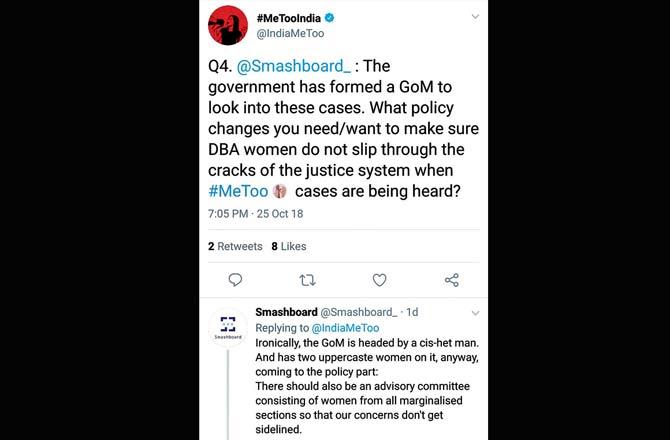Divya Kandukuri, who runs the Twitter account EverydayCasteism, and almost single-handedly propelled #MeTooIndia into a more inclusive direction, talks about representing the marginalised

Divya Kandukuri. Pic/Sayyed Sameer Abedi
When we connect with freelance journalist Divya Kandukuri on Twitter for an interview, she dodges the request by suggesting the name of fellow activist Ngurang Reena, research scholar at Jawaharlal Nehru University, Delhi, and co-founder of The Ngurang Learning Institute, Arunachal Pradesh. "I think [it's] her voice [that] needs to be heard," she says. But we persist, for the story is about broadening the #MeToo movement to include everyone: women in the cities and women in villages. The topic has been at the top of Kandukuri's mind, and, at the forefront of discussions on the #MeTooIndia Twitter handle since her fierce tirade last week. So, she relents.
On Wednesday, mid-day carried a story on how MeToo: Mumbai Chapter's decision to choose Gallery Maskara in Colaba as the venue for its November 4 meet-up was derailed after Kandukuri's angry tweets. "Came across this poster of Mumbai #MeToo meet. Do u all see the irony in this? It is being organised at COLABA. In an art gallery space. Who will attend this? All the fancy south Bombay beach house butterflies? Do you promise that we won't get intimidated by your fanciness?" She bristled at its "elitist" undertones. The event was in response to the informal Delhi meet-up organised at Lodhi Garden on October 21 by Anoo Bhuyan, a journalist with The Wire. Her argument eventually prompted the organisers to postpone the meet-up with the assurance of hosting it at "closed yet easily accessible places".
More voices, more perspectives
What's interesting is that the sequence of events resulted in the organisers of #MeTooIndia offering Kandukuri the chance to be the guest curator of their Twitter handle for a day. "@DivyaKandukuri_ will be in the driving seat for the handle @IndiaMeToo Don't miss it! She's bound to take us for a great ride. [Warning: no seat belts provided for savarna fragility!] Join in/RT with love & solidarity to all fighting patriarchy," read the post. Savarna feminism refers to the strand of the Indian feminist movement that is dominated by upper-class, upper-caste Hindu women. It is usually equated with white feminism in Europe and the US.

It's been a couple of days since, but the 22-year-old, who goes by the handle EverydayCasteism on Twitter and Facebook, continues to be inundated with messages and posts. "Many women from marginalised groups personally messaged to say I did a good job, but there were also people who felt, by raising 'intersectional' concerns, I was pitting women against women. I chose to ignore those." Learning to filter the wheat from the chaff is something she has trained in all her life. Born in Ongole, Andhra Pradesh, Kandukuri has been battling casteist slurs for long. In fact, EverydayCasteism was born out of her experiences. "People would pass remarks like, 'You speak good English and dress
How come you are Dalit?' In order to escape the snide comments, I studied hard and scored 97 per cent in my tenth standard, which got me direct entry into one of Delhi's top colleges [Lady Shri Ram College for Women]. But, there, I ran into the same kind of prejudice that I was trying to escape. People thought I got in through the reserved quota." Despite the bitter experiences, it was here that her "awakening" took place. Mingling with students from conflict zones, queer communities and underprivileged castes, and lapping up Dalit literature propelled her into the field of cultural advocacy and activism. She recalls the intimate gatherings that would take place in a shed near the college, where they would invite Dalit writers and professors to brainstorm over current issues.
Representing the oppressed
So, when she agreed to take up the baton of the #MeTooIndia Twitter handle, she knew what she was signing up for; it would mean representing oppressed communities. In fact, Kandukuri doesn't mince words when she says it's simply the reach the platform offered her that made her come onboard. "Honestly, neither EverydayCasteism nor Smashboard, a Twitter handle that I curate that aims to combat patriarchy, had the number of followers that #MeToo did, which is about 35K. It was a chance to bring in more diversity," she says. In the same vein, she adds, "I was so nervous, because it's a huge responsibility."
She has had to answer some tough questions on the platform. Will groups such as yours help them take the lead? Reclaim the space? How do you plan to organise? How can the rest of us help? The answer, she believes, lies in consulting women from marginalised sections for their opinions. And, by that, she does not mean inviting them to curate for a day, but to take on leadership roles. "I would say, have them in your panels on any issue [please don't use them just as token, by the way], have them in your organisations in decision-making and advisory roles." She goes on, "How many of you know about Jisha, Delta [Dalit women who were brutally raped in 2016]? That tribal women get raped by CRPF every day? What it takes for a marginalised woman to get justice as compared to upper-caste feminists? Bring that out, and show equal outrage by joining these movements and making them mainstream."
#MeToo not new
For Kandukuri, the #MeToo movement in India is not really a new development. She traces it to 24-year-old law student Raya Sarkar publishing a list on Facebook accusing more than 50 Indian professors of sexual harassment. "Some of the women who are backing and praising the movement now are the same people who, a year ago, were bashing Sarkar. They were dismayed by the initiative on Facebook, in which men were being listed and named as sexual harassers with no context or explanation." According to her, the reason it has received legitimacy now is because of the involvement of privileged women. But, for it to have a long-lasting impact, it needs to percolate to the lower rungs. "It's only when we start fighting against sexual harassment against marginalised communities such as Dalits, adivasis, OBCs, transwomen and women with disabilities, will it really be a movement."
Catch up on all the latest Mumbai news, crime news, current affairs, and also a complete guide on Mumbai from food to things to do and events across the city here. Also download the new mid-day Android and iOS apps to get latest updates
 Subscribe today by clicking the link and stay updated with the latest news!" Click here!
Subscribe today by clicking the link and stay updated with the latest news!" Click here!





